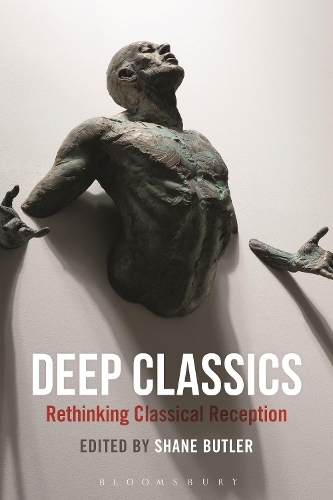
Deep Classics: Rethinking Classical Reception
(Hardback)
Available Formats
Publishing Details
Deep Classics: Rethinking Classical Reception
By (Author) Professor Shane Butler
Bloomsbury Publishing PLC
Bloomsbury Academic
5th May 2016
United Kingdom
Classifications
Tertiary Education
Non Fiction
European history
Literary studies: ancient, classical and medieval
937
Physical Properties
Hardback
360
Width 156mm, Height 234mm
680g
Description
Fragmented, buried, and largely lost, the classical past presents formidable obstacles to anyone who would seek to know it. 'Deep Classics' is the study of these obstacles and, in particular, of the way in which the contemplation of the classical past resembles and has even provided a model for other kinds of human endeavor. This volume offers a new way to understand the modalities and aims of Classics itself, through the ages. Its individual chapters draw fruitful connections between the reception of the classical and current concerns in philosophy of mind, cognitive theory, epistemology, media studies, sense studies, aesthetics, queer theory and eco-criticism. What does the study of the ancient past teach us about our encounters with our own more recent but still elusive memories What do our always partial reconstructions of ancient sites tell us about the limits of our ability to know our own world, or to imagine our future What does the reader of the lacunose and corrupted literatures of antiquity learn thereby about literature and language themselves What does a shattered statue reveal about art, matter, sensation, experience, life Does the way in which these vestiges of the past are encountered sitting in a library, standing in a gallery, moving through a ruin condition our responses to them and alter their significance And finally, how has the contemplation of antiquity helped to shape seemingly unrelated disciplines, including not only other humanistic and scientific epistemologies but also non-scholarly modes and practices In asking these and similar questions, Deep Classics makes a pointed intervention in the study of the classical tradition, now more widely known as 'reception studies'.
Reviews
The fruits of this volume are various. As a whole, it provides a welcome recharging of an intermittent conversation about how we conceive of, relate to and study the ancient world. * Classics Ireland *
As a breeding ground of Ph.D. theses, this is wonderfully fertile soil ... [The book] opens areas where we may not have looked before. * Classics for All Reviews *
If one reads the collection sequentially ... What follows is a series of diverse and absorbing chapters ranging in form from narrow(er)-focus case studies (e.g. M. Payne, S. Nooter) to wide-focus meditations on the state of the field. The pieces are thoughtful, often provocative, always thoughtprovoking. * The Classical Review *
If you want the deepest thoughts of the cleverest classicists alive today, read this volume. These essays bore into our relationship with the past, exposing and exploiting the sublime, geological metaphors of profundity and collapse that structure our relationship with distant antiquity. Yet for all that they bore, they never bore: these are thrilling soundings, which will captivate anyone interested in (re)thinking deep antiquity. * Tim Whitmarsh, A. G. Leventis Professor of Greek Culture, University of Cambridge, UK *
The subtitle of this important book calls on us to rethink classical reception, currently the fastest growing area of the subject but one badly in need of a fresh injection of intellectual energy. This Shane Butler, with his powerful idea of 'Deep Classics', and his team of talented contributors provide in spades. Anyone interested in how classical reception studies are best pursued will benefit from reading it. * Charles Martindale, Emeritus Professor, University of Bristol, UK *
Every page brings new, discrete pleasures. These essays dazzle in their inventiveness and vitality. This collection is powerful reminder about why the study of classical antiquity and its legacy matters. * Alastair Blanshard, Paul Eliadis Professor of Classics, The University of Queensland, Australia *
In its capacity for provocation as much as theoretical self-awareness, the present volume is a major intervention in classical reception studies. It provides an excellent core sample of the state of the art with the confident hallmarks of a sub-discipline that is no longer required to make the case for its existence, or perhaps worse, domesticated as "a detachable postscript" Deep Classics: Rethinking Classical Reception is essential and stimulating reading for those both in the field of classical reception studies and beyond: it certainly deserves a wide audience. * Bryn Mawr Classical Review *
Author Bio
Shane Butler is Professor of Classics at Johns Hopkins University, USA. He is author of The Ancient Phonograph (2015) and co-editor of Synaesthesia and the Ancient Senses (2013).
